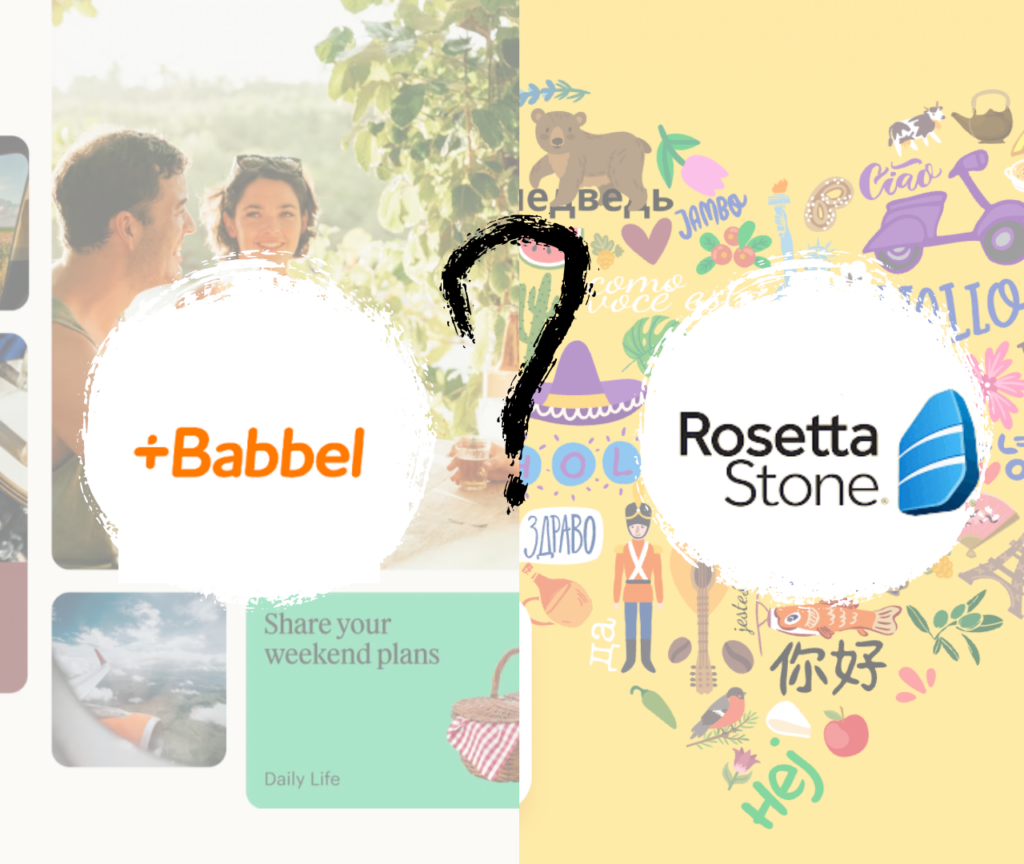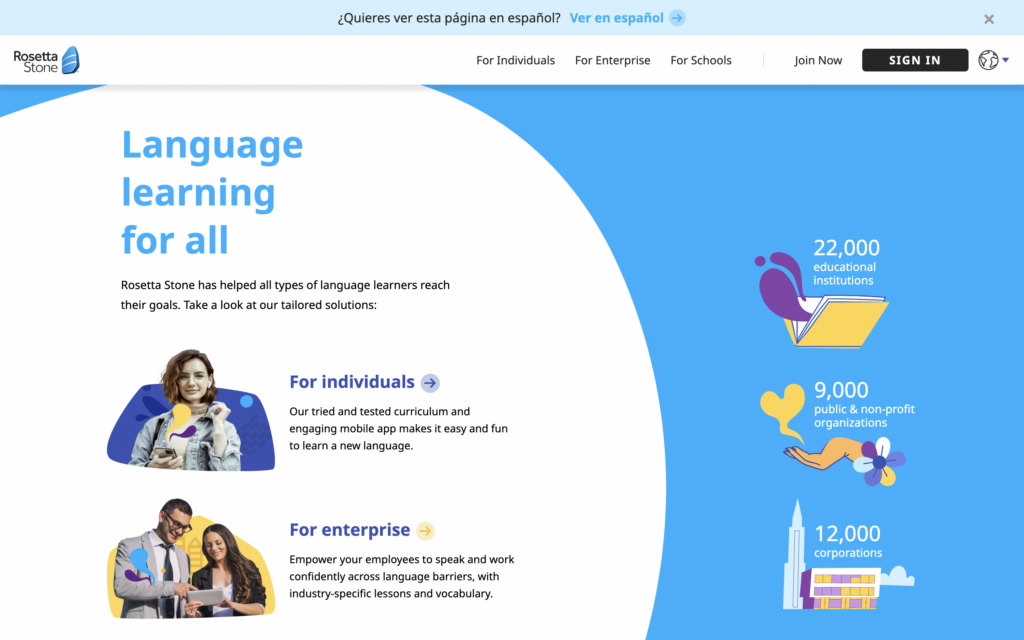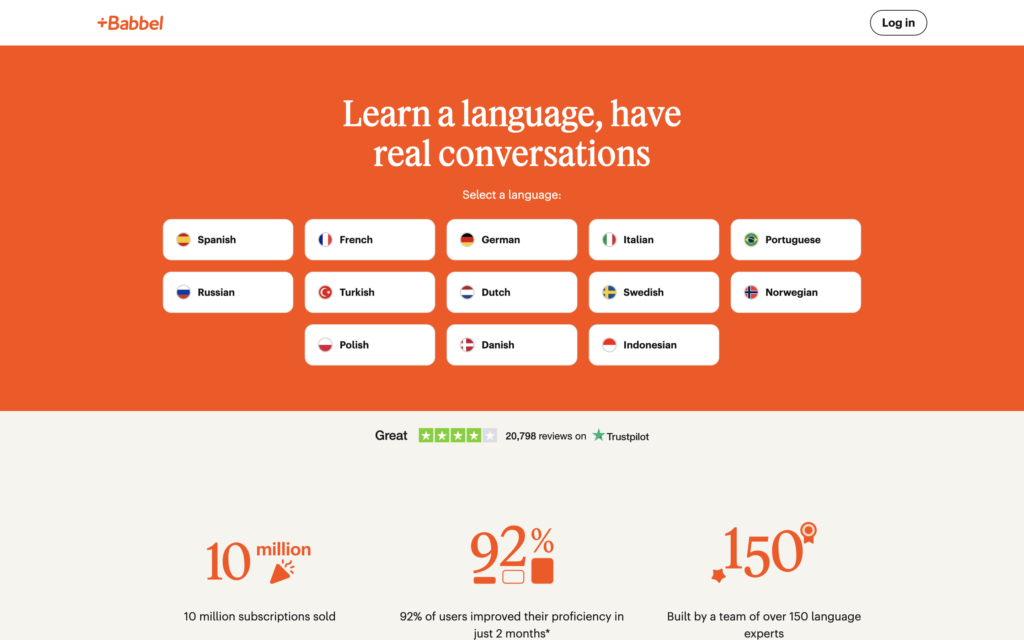In the digital era, the quest to break down language barriers and unlock the rich tapestry of global cultures has been made more accessible than ever before, thanks in part to platforms like Babbel and Rosetta Stone. These two language learning giants have transformed the way we approach new languages, offering immersive experiences right from our smartphones and computers.
Babbel brings a practical approach to language learning, focusing on conversational skills and cultural nuances to equip learners for real-life situations. With lessons crafted by linguistic experts and tailored to your native language, Babbel aims to get you speaking from the first lesson.
Rosetta Stone, with its longstanding reputation, takes a more immersive route. It leverages its Dynamic Immersion method to help learners think directly in the new language, promoting a natural learning curve similar to how we learned our first language.
Each platform has its unique strengths: Babbel’s approach is structured yet flexible, efficient for those looking to apply their new language skills promptly. Rosetta Stone, on the other hand, delves deep into the immersive experience, which can be especially beneficial for auditory learners and those who have the time to engage with a new language more intuitively.
So whether you’re planning a trip abroad, looking to expand your business globally, or just eager to enjoy literature and films in their original language, this comparison aims to guide you in choosing the right platform for your language learning journey.
Stay tuned as we explore, compare, and unravel what Babbel and Rosetta Stone have to offer, so you can decide which path to fluency aligns best with your language aspirations.
Table of Contents
- Babbel vs Rosetta Stone—A 30,000-foot Overview
- A High-level Babbel Review
- A High-level Rosetta Stone Review
- Babbel vs Rosetta Stone—Pricing
- Babbel vs Rosetta Stone—Courses and Instructors
- Babbel vs Rosetta Stone—User Experience
- Babbel and Rosetta Stone alternatives
- Final Verdict: Babbel or Rosetta Stone—which one is worth it?

Babbel vs Rosetta Stone—A 30,000-foot Overview
Embarking on the journey of learning a new language is an adventure filled with new sounds, words, and grammatical structures. Both Babbel and Rosetta Stone promise to be your guides in this venture, but they each chart a different course.
A High-level Babbel Review
Babbel prides itself on a conversational approach. It starts by teaching you phrases and sentences you are likely to use in real-life scenarios. Each lesson builds upon the last, and before you know it, you’re crafting sentences and engaging in dialogues.
Key Highlights:
- Practical Lessons: Babbel’s focus on conversational learning makes it a practical choice for travelers and professionals.
- Customized Experience: The lessons are tailored to your native language, which can speed up the learning process.
- Cultural Immersion: Babbel integrates cultural notes to provide context, enhancing your understanding of the language.
A High-level Rosetta Stone Review
Rosetta Stone has been a household name in language learning for decades, advocating for full immersion. Its methodology is built around learning the language as a child does, without translations, focusing on images and sounds to build vocabulary and grammar.
Key Highlights:
- Immersive Learning: The absence of your native language in lessons encourages thinking directly in the new language.
- Intuitive Understanding: It promotes a deeper, more natural understanding of the language.
- Speech Recognition: Its TruAccent™ speech-recognition engine is designed to fine-tune your pronunciation to sound more like a native speaker.
Comparing Pathways to Fluency
Babbel and Rosetta Stone might both lead to language proficiency, but they invite learners to walk different paths:
- Babbel is like a guided tour in a foreign country, where you’re given useful phrases and cultural insights to navigate and interact confidently.
- Rosetta Stone is more akin to being dropped into a new city and learning to live like a local, absorbing the language organically as you explore.
Ultimately, the choice between Babbel and Rosetta Stone might boil down to your learning style, goals, and timeline. Do you prefer structured guidance or immersive exploration? Is your priority conversational fluency or comprehensive language command?

Babbel vs Rosetta Stone—Pricing
When deciding between Babbel and Rosetta Stone, pricing plays a significant role. Both platforms offer a range of options tailored to different learning commitments and budgets. Let’s compare their pricing structures to help you determine which platform offers the best value for your language learning goals.
Babbel Pricing
Babbel’s pricing varies depending on the duration of the subscription, with options for those who prefer a short-term commitment or long-term access:
For access to the app plus live classes, the prices are as follows:
- 1 month: €99.00 per month.
- 3 months: €69.66 per month, billed every 3 months.
- 6 months: €59.83 per month, billed every 6 months.
- 12 months: €49.91 per month, billed annually.
For the Babbel app alone, without live classes, the prices are:
- 6 months: €8.99 per month, billed every 6 months.
- 12 months: €5.99 per month, billed annually.
Lifetime: A one-time payment of €299.99 for access to all languages.
Annual Subscription: A longer-term plan at €5.99 per month, billed annually.
Babbel’s pricing structure is designed to provide flexibility and caters to both casual learners and those looking to immerse themselves fully.
Rosetta Stone Pricing
Rosetta Stone offers different subscription plans, including a lifetime option that covers multiple languages, which might appeal to polyglots or those with long-term learning goals:
3-Month Subscription: A short-term commitment at $15.99 per month, ideal for beginners.
Annual Subscription: At $10.50 per month (billed annually), it offers a balance between commitment and cost.
Lifetime Subscription: For a one-time payment of $199, you get unlimited access to all 25 languages, making it the best value for those planning to study multiple languages over time.
Making Your Choice
When choosing between Babbel and Rosetta Stone, consider how each plan fits into your lifestyle and learning objectives:
- Are you looking for a short-term learning tool to prepare for a trip or specific event?
- Do you want ongoing access to study one or more languages at your own pace?
- Is cost a deciding factor, or are you willing to invest more for comprehensive, long-term access?
Rosetta Stone’s lifetime subscription is particularly noteworthy for those with an expansive language learning horizon, offering all languages at a price that rivals Babbel’s single-language plan. Conversely, Babbel’s flexible monthly plans can be appealing for learners seeking a shorter commitment without the need for lifetime access.
With the pricing laid out, you can weigh which platform offers the features you value most at a price that aligns with your budget and language learning aspirations.
Babbel vs Rosetta Stone—Courses and Instructors
When it comes to language courses, both Babbel and Rosetta Stone bring their unique teaching methods to the table, each backed by years of experience and linguistic research.
Babbel’s Courses:
Babbel provides interactive courses in several languages, including English, Spanish, French, German, Italian, Portuguese, and Russian. It is designed for practical use, aiming to get you speaking your new language quickly and confidently. The platform is known for its structured curriculum, where each lesson builds upon the previous one, allowing for a steady progression from simple phrases to more complex conversations.
Popular features include Babbel Live, which offers live classes with language instructors, allowing for personalized instruction. Moreover, Babbel’s magazine and podcasts offer additional resources to learners, enhancing the learning experience with cultural insights and practical language usage.
The methodology behind Babbel combines cognitive and communicative teaching techniques, including spaced repetition to enhance long-term retention of vocabulary. However, content may vary across languages, with some offering more advanced courses than others.
Rosetta Stone’s Courses:
Rosetta Stone offers a dynamic immersion approach, where learners are encouraged to associate words with images and context rather than translations. This methodology is about intuitively building language skills through immersion, mirroring how we learn our first language.
In terms of instructors, Rosetta Stone does not rely on live teaching but instead uses an automated system that is heavily focused on pronunciation and listening skills through its TruAccent speech-recognition engine.
Choosing the Right Course for You:
When deciding between Babbel and Rosetta Stone, it’s important to consider your learning style and preferences:
- If you prefer structured learning with the added benefit of live instruction and cultural context, Babbel may be the way to go.
- If you lean towards an immersive experience that teaches you to think in the new language, Rosetta Stone could be your choice.
Ultimately, both platforms offer a comprehensive suite of language learning tools, and the best choice will depend on your personal goals, preferred learning style, and the particular language you wish to learn.
Babbel vs Rosetta Stone—User Experience
When choosing between Babbel and Rosetta Stone, the user experience is a significant factor. Both platforms strive to make language learning accessible and engaging, but they have different approaches that might appeal to different types of learners.
Babbel:
Babbel is appreciated for its structured and comprehensive lessons that cover speaking, listening, reading, and writing. The platform’s method is grounded in cognitive and communicative teaching techniques, developed in collaboration with language experts. Users particularly enjoy the real-life context that Babbel provides, which makes the learning process more meaningful and applicable. The Babbel Live feature, offering live virtual classes with native speakers, receives high praise for its interactive and engaging approach to language instruction. The platform also features a variety of interactive exercises, such as speaking and writing, allowing learners to practice and reinforce their language skills. Additionally, Babbel’s interface is noted for being user-friendly and intuitive, which simplifies navigation and learning.
However, some users find the pacing of the lessons a bit slow and prefer longer, more sustained classes for maintaining momentum in learning. The interface, while user-friendly, may have some annoyances, particularly when not used on a touchscreen device. Babbel’s focus is mostly on European languages, which may limit options for those interested in Asian languages.
Rosetta Stone:
Rosetta Stone offers a unique immersion method that relies heavily on associating words with images and sounds, aiming to mimic the way we naturally learn a language as children. This can be an incredibly intuitive way of learning, especially for those who are visual or auditory learners. Rosetta Stone’s methodology might appeal more to those who prefer to learn independently and figure out the patterns of a language on their own.
Rosetta Stone is often described as providing a very immersive experience but with less direct explanation of grammar or context compared to Babbel. Users who prefer a more hands-on, structured approach with clear explanations might find Babbel more to their liking.
My Final Thoughts:
Both Babbel and Rosetta Stone have their strengths and can be effective tools depending on your learning style and preferences. If you’re seeking a structured, interactive, and context-rich learning experience with access to live instruction, Babbel is a great choice. On the other hand, if you’re looking for an intuitive and independent study method that encourages you to make connections on your own, Rosetta Stone might be the way to go. It’s essential to consider these aspects of the user experience to choose the platform that will be the most enjoyable and effective for your language learning journey.

Babbel and Rosetta Stone alternatives
Rosetta Stone vs Babbel vs FluentU
- Rosetta Stone immerses you in the language without translations, using images and sounds for an intuitive learning experience.
- Babbel uses interactive lessons that build upon previous knowledge, focusing on practical language usage in 10-15 minute sessions.
- FluentU takes real-world videos, like YouTube clips and movie trailers, and turns them into personalized language learning lessons, suitable for those who enjoy a more natural, context-rich learning environment.
Rosetta Stone vs Babbel vs Memrise
- Memrise stands out for its use of spaced-repetition and authentic videos, making it excellent for vocabulary building. While it has a strong focus on memorization and offers content mostly in isolation, it is user-friendly and can be very engaging for learning new words and phrases.
Rosetta Stone vs Babbel vs Pimsleur
- Pimsleur is an audio-focused learning program, emphasizing verbal communication and practical language use. It’s particularly beneficial for those who prefer learning through conversation and auditory exercises, and can be an effective method for building speaking confidence.
Choosing the right platform will depend on your personal learning style, whether you prefer interactive applications, immersion through videos, a focus on vocabulary, or auditory learning methods. Each of these alternatives offers a unique angle on language acquisition, providing options for different preferences and goals.
Babbel FAQ
Even with a full schedule, Babbel suggests just 15 minutes of learning per day can be effective, and their Offline Mode means you can learn during commutes or whenever it fits into your schedule.
Absolutely not! Age is not a barrier to learning a language with Babbel. The key is motivation, not age.
Effectiveness varies by individual goals, but an independent study showed that using Babbel for three weeks could enable you to have simple conversations in a new language.
Babbel employs a multimodal teaching strategy that accommodates different learning preferences, ensuring material is retained in your long-term memory.
Babbel is designed with user-friendliness in mind, allowing learners to easily navigate through the lessons on any device and start learning immediately.
Rosetta Stone FAQ
Rosetta Stone offers an extensive range of language courses including commonly studied languages like Spanish, French, and German, as well as less commonly offered ones such as Hebrew, Hindi, and Vietnamese.
You can switch languages once. If you want to change again, you’ll need to start fresh with a new account.
Absolutely, Rosetta Stone is web-based and works on most computers, with the exception of Chromebook devices.
When you log in for the first time, select “First Time Users” and then carry out the “Check System Readiness” process to ensure compatibility.
Yes, you’ll require a USB headset that includes a microphone for the best experience with Rosetta Stone.
To view your learning progress and the time you’ve invested, simply log in and navigate to the “My Reports” section.
Final Verdict: Babbel or Rosetta Stone—which one is worth it?
I’ve spent a good amount of time toggling between Babbel and Rosetta Stone, trying to get the hang of a new language. Here’s the scoop: Babbel felt like having a friendly tutor guide me through the basics, making sure I could actually use what I learned in real conversations. It’s hands-on and practical. Rosetta Stone, on the other hand, threw me into the deep end in a way, challenging me to pick up words and phrases through pure immersion. It was like being a kid again, learning by intuition. Both have their charm, but your choice really hinges on how you like to learn. Crave structure and real-world application? Babbel’s your buddy. Want to learn like you’re living abroad? Rosetta Stone might be your ticket.

